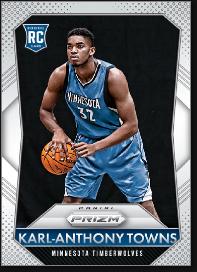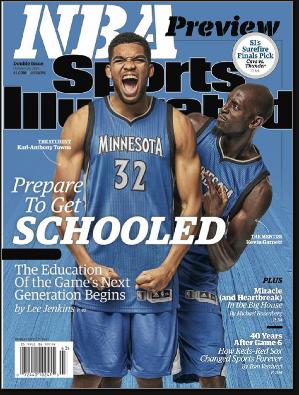
Karl-Anthony Towns Jr. was born November 15, 1995 in Piscataway, NJ. His father, Karl-Anthony, starred for Monmouth University in the 1980s and coached AAU hoops teams and the varsity squad at Piscataway Technical High. Karl-Anthony was good enough to practice with the JV by 5th grade.
Karl-Anthony attended grade school at Our Lady of Fatima and then transferred to T. Schor Middle School, where he repeated 7th grade. This is not unusual for basketball prodigies, as it gives them an additional year of development. At this point, Karl-Anthony stood 6’10” and was dominating AAU tournaments in his age group.
Karl-Anthony was offered a scholarship to play for the prestigious Pennington School but chose to stay closer to home and enrolled at St. Joseph’s prep school in Metuchen. He led the Falcons to a state championship in his freshman year. St. Joe’s repeated as state champs in 2013 and 2014. Karl-Anthony was named 2014 Gatorade National Player of the Year.
Karl-Anthony also played for the Dominican Republic’s U-17 team since his mom, Jacqueline Cruz, was born in that country. Kentucky coach John Calipari coached the team.
Karl-Anthony modeled his game after Kevin Durant. He liked to run the floor, shoot from the outside and drive the lane. There was some concern that he wasn’t developing his low-post game, but by the time he entered college, he had greatly improved this part of his repertoire. Among the colleges recruiting Karl-Anthony were Duke, Michigan State, Baylor, West Virginia, Kentucky and, of course, Rutgers. He decided to go with Kentucky, knowing he would likely stay only a year before entering the NBA Draft.
As part of Calipari’s deep rotation, Karl-Anthony played 20 to 25 minutes a game in 2014–15, and averaged 10.3 points and 6.7 rebounds. He and SEC Defensive Player of the Year Willie Cauley-Stein both earned All-America honors as the Wildcats rolled into the NCAA Tournament as prohibitive favorites with a 34–0 record. Their season ended prematurely when they blew a fourth-quarter lead against Wisconsin and lost, 71–64. Karl-Anthony led Kentucky in scoring in three of the five tournament games, including 25 in the Midwest Regional Final against Notre Dame.

Karl-Anthony declared for the NBA Draft and was selected with the #1 overall pick by the Minnesota Timberwolves. The T-Wolves, perhaps suspecting they would land Karl-Anthony or Duke center Jahlil Okafor, had acquired Kevin Garnett (left) from the Nets the previous winter. Garnett was the perfect tutor for Karl-Anthony. In his first NBA game, the rookie scored 14 points and hauled down 12 rebounds to make the difference in a 112–111 road win over the Lakers.
Karl-Anthony showed almost immediately that he was ready to play in the NBA. He topped 25 points several times in the first half and, in January against the Jazz, he scored 32 points and had 12 rebounds—becoming the youngest player in 9 years to have a 30–10 game. In February, Karl-Anthony defeated guard Isaiah Thomas of the Celtics in the All-Star Skills Challenge, becoming the youngest and tallest player to do so. By season’s end, he had obliterated Christian Laettner’s franchise scoring record for rookies.
Karl-Anthony’s final numbers were 18.3 points and 10.5 rebounds in 82 games. He shot 54.2 percent from the field and 81.1 percent from the line. Karl-Anthony was named Conference Rookie of the Month in all six months and was a unanimous pick for NBA Rookie of the Year. Teammate Andrew Wiggins had won the award the year before, making Minnesota the first team to do so since the Buffalo Braves (Bob McAdoo and Ernie DiGregorio) in the 1970s.
Karl-Anthony blossomed into a major offensive force in his second season. He torched the Knicks in a November game for 47 points and 18 rebounds. In December, he recorded his first career triple-double, with 15 points, 11 rebounds and 10 assists. In both cases, however, Minnesota lost close games. This was the problem—the T-Wolves were not even a .500 team. Although Karl-Anthony’s game was evolving, the team was not.
The Timberwolves finished the season 31–51. Karl-Anthony’s second-year numbers were huge: he averaged over 25 points and 12 boards per game. He notched his 100th career double-double in March, becoming the second-youngest player in history to do so. He broke Kevin Love’s team record for points in a season and completed a historic campaign as the first NBA player with 2,000 points, 1,000 rebounds and 100 three-pointers.
In 2017–18, the T-Wolves added veterans Jimmy Butler and Jeff Teague to the roster. These were literally game-changing acquisitions, as Minnesota took a huge step toward playoff contention. Butler, a legendary workhorse, and Teague, a superb playmaker, enabled Karl-Anthony and Andrew Wiggins to develop their games without shouldering the entire responsibility for winning and losing each night. The season got off to slow start, including a 12-game losing streak. Karl-Anthony helped turn things around with consistent scoring and rebounding performances. He was named to the All-Star Game that winter. He had 17 points and tied LeBron James for the most rebounds in the game, with 10. In a March win over the Clippers, Karl-Anthony scored 56 points to set a new franchise record. In the final game of the regular season, he had 26 points and 14 rebounds in an overtime win that clinched a playoff berth for Minnesota—its first since 2004. The double-double was his 68th of the year, which led the NBA. The Timberwolves fell to the Rockets in the first round, 4 games to 1, but Karl-Anthony played well.
Karl-Anthony set new career bests in 2018-19 in rebounds, steals and assists to go along with another strong scoring season, with 24.4 points per game. The only glitch in his fourth pro campaign was that he missed his first game, following a car accident. His 303 consecutive starts from the start of his career was the most in almost 50 years. He played in his second All-Star Game, but the T-Wolves missed the playoffs, going 36–46. Karl-Anthony also led the league in fouls for the second year in a row.
In 2019-20, Karl-Anthony was on his way to his best season at age 24 when it ended after 35 games. He opened the campaign with 36- and 37-point games in wins over the Nets and Hornets, and was averaging 26.5 points, 10.8 rebounds and 4.4 assists when everyone went home in March.
Karl-Anthony came down with Covid midway through the 2020–21 campaign and missed a month. He survived unscathed but his mother did not. She passed away in April. For many years, Jacqueline Cruz Towns had been a familiar site at T-Wolves home games. In all, Karl-Anthony lost six family members to the virus.
Karl-Anthony’s year-end numbers were still terrific, as he averaged 24.8 points per game and set new career-bests in assists and free-throw percentage. It was not until 2021–22, however, that the T-Wolves made it back to the postseason.
Despite the heartbreak, Karl-Anthony and second-year guard Anthony Edwards both averaged over 20 points a game and Minnesota finished 46-36. They beat the Clippers in the play-in game but did not survive a first-round meeting with the Memphis Grizzlies. Karl-Anthony led the team with 24.6 points and 9.8 rebounds per game, and had a huge performance in the series opener against the Grizzlies with 29 points and 13 rebounds. He had 33 and 14 in Game 4, but those were the club’s only victories.
Early in the 2022-23 campaign Karl-Anthony felt a pop in his right calf. What was initially diagnosed as a mild strain kept him out until the final game of the regular season. He scored 30 points upon his return and was healthy for the playoffs, but after making it through the play-in series, the Timberwolves did not survive the first round, falling to the eventual champions, the Nuggets. Karl-Anthony averaged over 20 points a game for the seventh year in a row and notched a career-best 4.8 assists, albeit in just 29 games.
Healthy for the most of 2023-24, Karl Anthony returned to form as the T-Wolves improved from 42 wins to 56. In a January game against the Hornets, he netted 62 points to set a new franchise record. He dropped 50 in the All-Star Game10 days later, including a record 30 points in one quarter. The Timberwolves were a complete team, with Edwards having blossomed into a full-fledge superstar, Rudy Gobert providing stellar defense and Naz Reid excelling in a sixth man role.
Minnesota rolled into the playoffs looking to win their first postseason series in two decades. Karl-Anthony had clutch performances against the Suns and Nuggets as the Timberwolves made it to the Western Conference Finals. Their magical run ended with a 4 games to 1 loss the Luka Doncic and the Mavs.
Prior to the start of the 2024–25 season, Karl-Anthony was the key piece of a three-team trade between the Timberwolves, Hornets and Knicks. He ended up with his “home” team in New York and gave the Knicks a big-time center—something they needed badly. Karl-Anthony had scored 40 or more three times by the end of 2024 and the Knicks went into 2025 as a real threat to contend for a championship.
Karl-Anthony was picked for the All-Star Game for the second year in a row and was named third-team All-NBA after a season that saw him average 24.4 points and a career-best 12.8 rebounds per game. In his December return to the Target Center as a Knick, he scored 32 points and pulled down 20 rebounds. That month, he was named Eastern Conference Player of the Month. In February, Karl-Anthony notched back-to-back 40-point games for the first time as a pro.
The Knicks entered the 2025 playoffs as an extreme longshot to reach the finals, but two amazing comebacks in their second-round meeting with the Celtics—and an Achilles injury to Jayson Tatum—punched their ticket to the conference finals against the Pacers. Karl-Anthony missed a free throw late in Game 1 that helped Indiana make a great comeback and steal an overtime victory. In Game 2, he contributed little as New York went down 0-2. But in Game 3, Karl-Anthony played one of the best games of his career to lead the team to victory in a must-win contest.